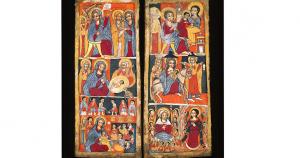All was transformed, each culture, every thought, by Christmas. Each good from every time was kept in safety for all time as itself.
One can see an example in the metamorphosis of mere Hellenism to the glories of Hellenic, classical, Christian society. Nothing of the old pagan, philosophical tradition was (intentionally) lost. All was kept in context, the good and the bad, yet the Gospel written in Greek soon made all of Greek part of the divine order. There was no force needed. Why? The process began with those forced to adopt the Hellenism, bathed in it by Roman oppressors and their fellow travelers, who used the language, the images, to tell a broader truth.
When the humble find God, the powerful of this world cannot triumph. Whatever is beautiful, like the writings of Homer and Plato, are given new context by the Magnificat. The old is incorporated into a new so great and loving that nothing good, true, or beautiful in the old need be lost. The defects of such a culture, as Saint Basil pointed out, need not, should not, be denied either. After all, especially when we grow powerful, what we think are defects may not be! What do turn out to be wrong in any culture, especially our own, should turn us to self-examination and repentance.
Christmas is partially the process of the transformation of the culture of the powerful, the Roman occupiers and their local enablers, into something good and beautiful. This is a metamorphosis of the lowly forced to see what the occupiers would have them see. A Fredrick Douglass can take the culture forced on him and made it more divine by taking seriously what is good and condemning what is bad.
The Temple had been built by Herod, but tradition glorified that blood stained structure with the presence of the Mother of God. History brought the Son of God to that house and so the Temple fulfilled a greater theological purpose. Herod could take from sacred history
The colonizer comes and takes what he wishes and destroys what he does not value. Outside of Divine memory, where nothing good is lost, the appropriation is destructive.
Why?
The context is lost. The mother teaches her child peacefully, naturally within a beloved community. The tyrant imposes from outside, rending some beauty to his own ends.
We are all, of course, the product of tyranny and humility. The Sermon on the Mount, the verbal expression of Christmas, turns us from the tyranny to meekness. We draw down on our authentic roots and then the Church introduces us to the world. We rejoice as ourselves before the throne of King Jesus as part of throng containing every nation as themselves.
Babel is not reversed: we never go backwards. Instead, each tradition, each language, finds authentic commonality in our God without being lost. This is less translation than linguistic theosis: we speak as our mothers taught us made perfect. All is known and comprehended in God who helps us comprehend every tongue.
The cave of Bethlehem is not the cave-like structure of Plato’s Republic VII, yet the greater gives context to the lesser. The stable is larger than the Republic. Aksum finds a place. The Celestial Kingdom is there. All is known, comprehended, and made whole in the Christ. Like the Mother of God, we have all eternity to ponder Him in our hearts.













